Companies Risk Losing Young Talent by Falling Short on Workplace Technology, Survey Finds.
A Yooz study reveals that worker frustrations over low-tech employers can lead them to look for a new job — or even a new industry.
Purpose of the Study
Most businesses know that in a competitive marketplace, keeping up with the latest workplace technologies is important for optimizing operations and staying ahead of competitors. But many don’t realize that their technology choices are scrutinized by their employees as well.
To put a finger on the pulse of employee attitudes toward technology, the 2023 Yooz Survey: Technology in the Workplace asked 600 U.S. salaried workers across industries and age groups to describe their experiences and perceptions of workplace technology in 2023.
Among its findings, the survey identifies opportunities for employers to improve their workers’ experiences with technology — and highlights the risk of losing younger workers for not embracing new technologies soon enough.
Profile of Respondents
- 600 U.S. professionals over the age of 18 surveyed using the third-party platform Pollfish
- Salaried workers with annual household incomes of $50,000+
- Representing a wide range of industries including healthcare, finance and insurance, construction, restaurants, retail and manufacturing.
Key Findings
- Younger employees believe in the power of technology to make their jobs easier and are the first to seek out and embrace new technologies in the office.
- Younger workers prefer to work for an employer that embraces new technology.
- Respondents say lack of training is a key barrier to effectively using workplace technology.
- Respondents ranked the construction, restaurant and automotive industries as the least technologically advanced industries, and software as the most advanced.
- Across all age groups, respondents urged employers to embrace new technologies such as artificial intelligence, virtual reality, and automation technology.
Younger employees believe in the power of technology to make their jobs easier — and are the first to seek out and embrace new technologies in the office.
Younger employees tend to be the first to embrace new technologies at work, with 32% of salaried workers under 25 saying they are “among the first to experiment with and use them,” compared to 22% of workers 35 and older.
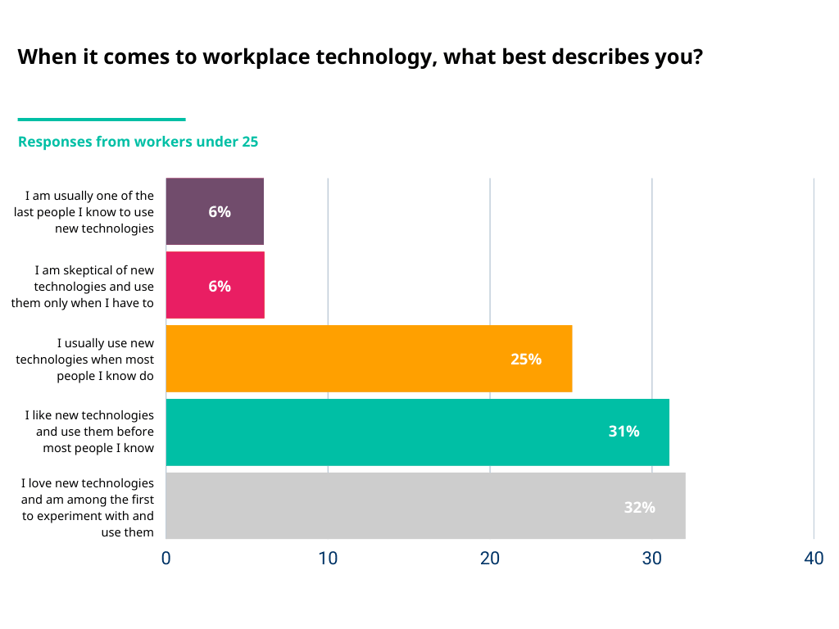
More than two-thirds of younger workers say they spend most of their work lives using workplace technologies — and nearly all agree that these technologies help them do their jobs better.
Among all respondents, 64% said they spent more than half their work days using workplace technologies, with 37% saying they spent more than three-quarters of their days using technology. Overall, 91% of respondents said this technology helped them do their jobs more efficiently.
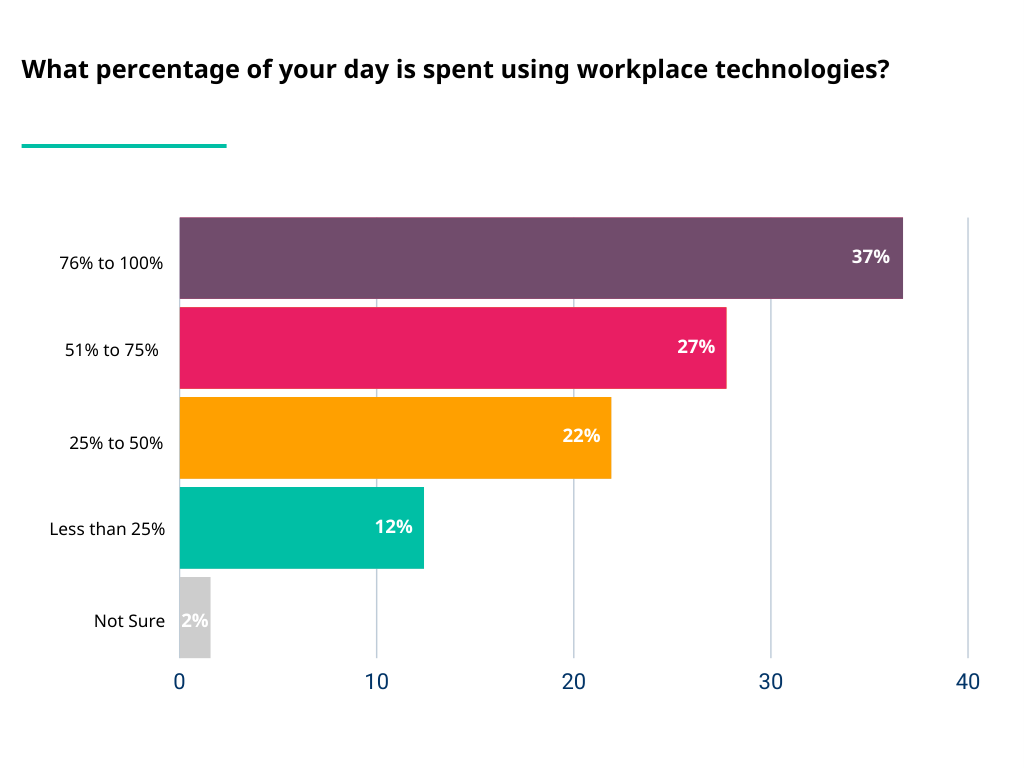
Younger workers prefer to work for an employer that embraces new technology.
Half of U.S. workers under 25 tie their industry’s adoption of new technology to their prospects of career advancement.
When asked, “To what extent do you agree or disagree with the statement: The way my industry views adopting new technology is a barrier to my career advancement,” 50% of workers under 25 said they either agree (29%) or strongly agree (21%) with this statement. This compares to just 30% of workers 25 and older who either agreed (22%) or strongly agreed (8%).
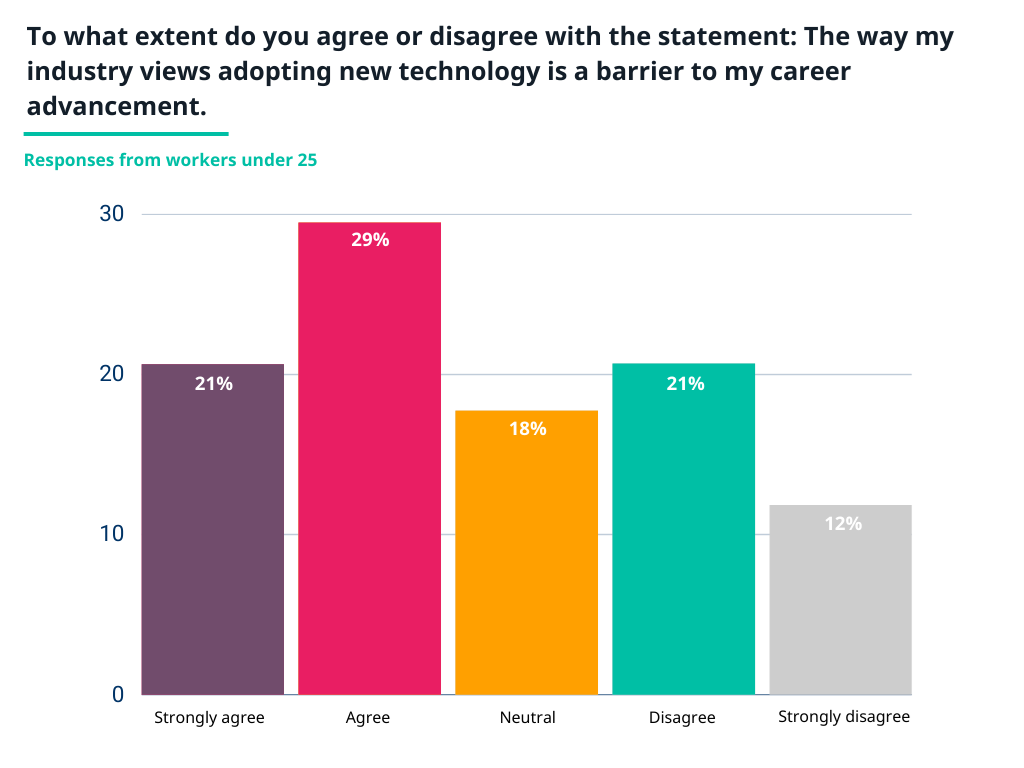
Respondents say lack of training is a key barrier to effectively using workplace technology.
Respondents expressed frustration when their employers failed to devote enough time to employee training or to keeping up with the times.
When asked, “What technological barriers prevent you from completing your job tasks effectively,” 30% of respondents overall cited “slow or outdated hardware or software” as the No. 1 barrier to efficiency, followed by “lack of training” (24%), “poor internet connectivity or reliability” (24%), and “incompatible software and systems (19%).
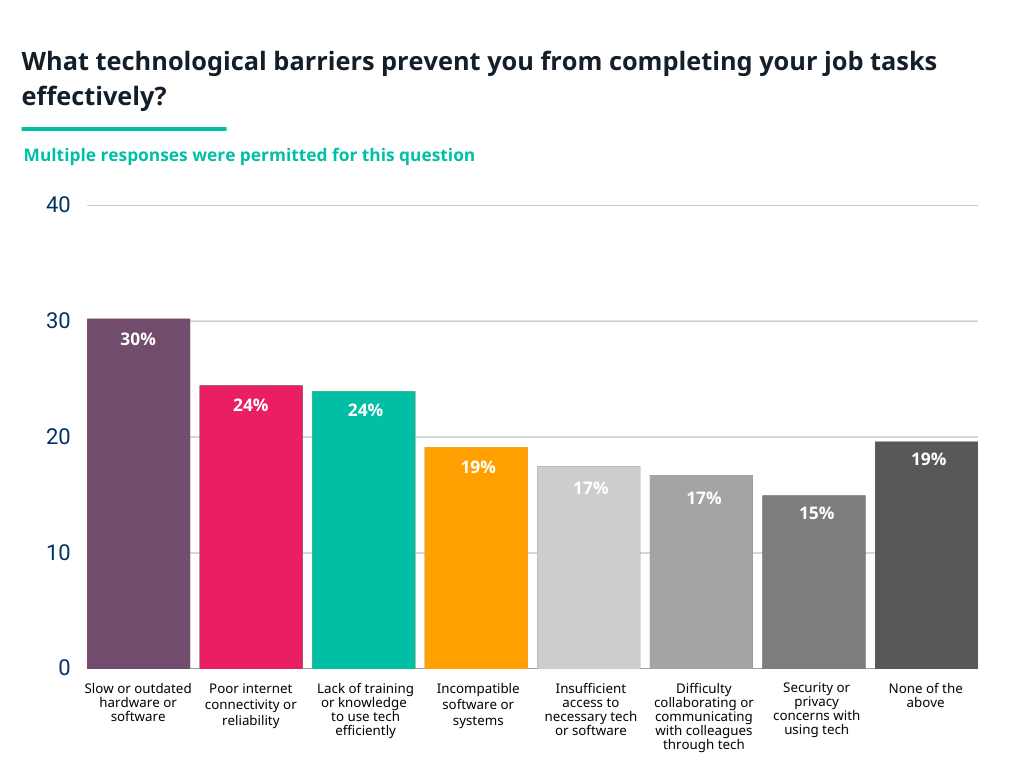
When asked, “When you do not feel adequately prepared to use new workplace technologies, what are the biggest reasons for this?” more than a third (33.9%) of respondents across all age groups said, “I am not given enough time to learn new technologies before I am expected to use them,” followed by 24% who answered, “Sometimes a new technology or tool is rolled out and no one even tells me about it,” and 18% who said, “My organization does a poor job of training me, because the training is not thorough enough.”
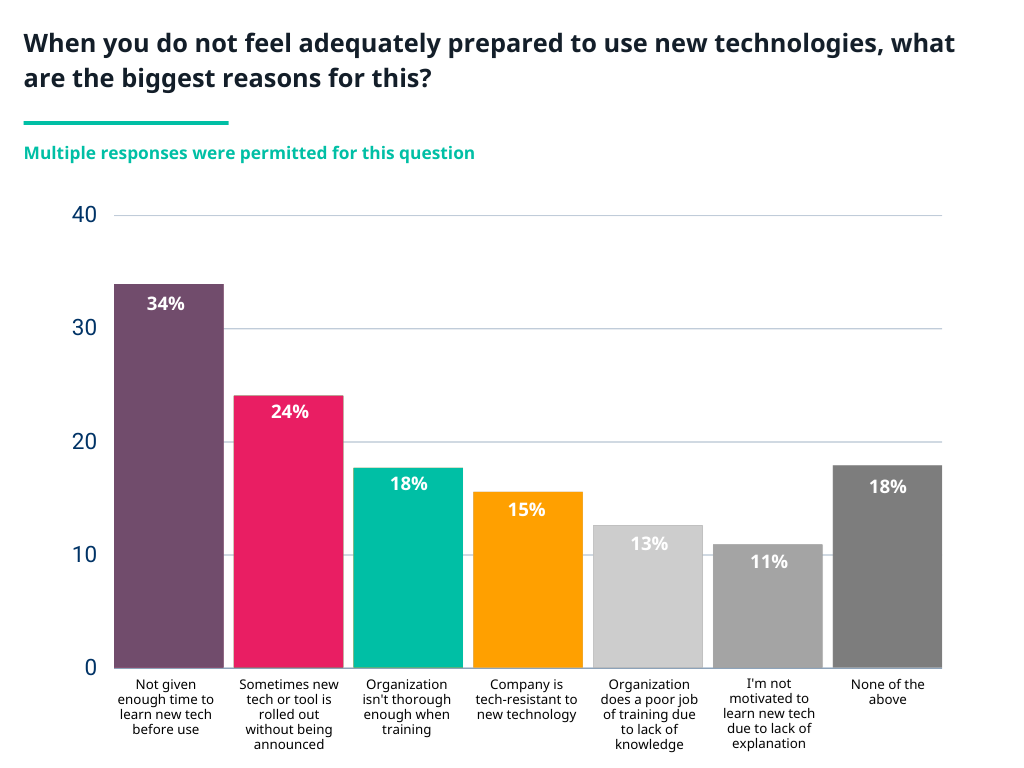
A lack of formal technology training programs could be responsible for some of this frustration. When asked, “Who typically teaches you how to use new workplace technologies?” only 24% said their organization’s IT department (20%) or HR department (4%). Most respondents cited more informal or self-serve sources, such as “online training materials” (26%), “my supervisor” (17%), or “my workplace peers” (15%). Another 16% of respondents said, “I am left to figure things out for myself, with little direction from my employer.”
Respondents ranked the construction, restaurant and automotive industries as the least technologically-advanced industries, and software as the most advanced.
Respondents were asked to rank 10 industries based on their perceived technological proficiency. While the software industry topped the list, the construction industry was perceived to be the least technologically competent, with the restaurant and automotive industries ranking just above it.
In an increasingly competitive landscape, this result suggests that lower-ranked industries must work harder to demonstrate their commitment to new technologies to attract younger workers.
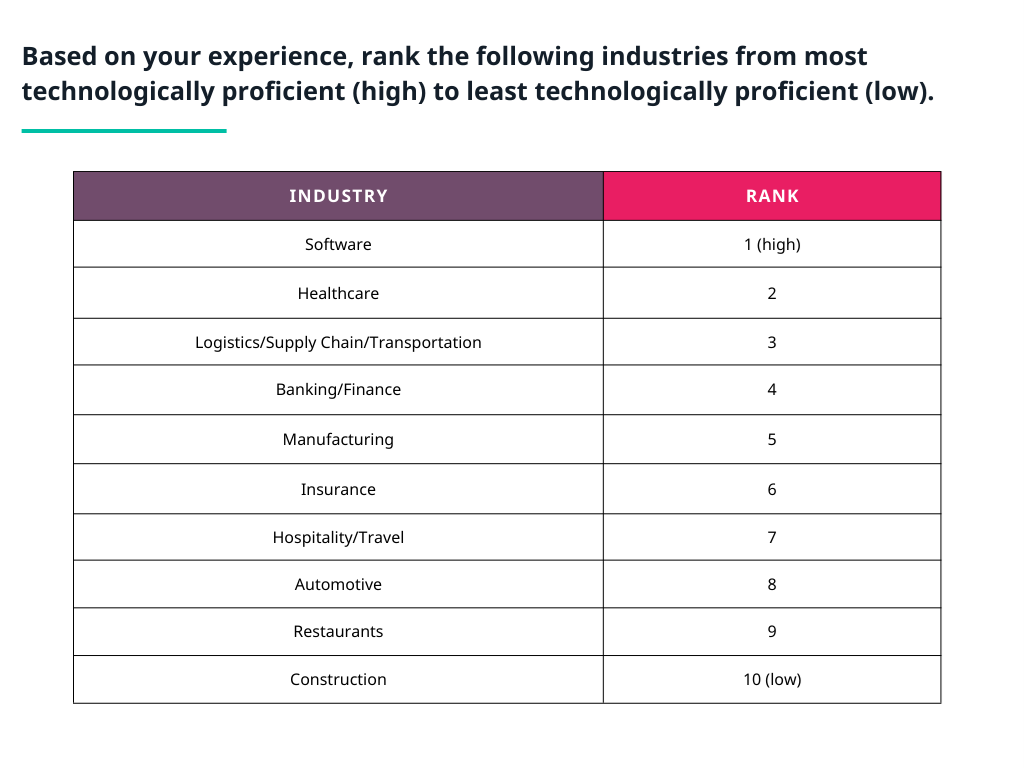
Across all age groups, respondents urged employers to embrace new technologies such as artificial intelligence, virtual reality and automation technology.
Americans are always on the lookout for new technologies, including those that can improve their work lives. This is especially true for younger workers—who are particularly excited about the potential of artificial intelligence.
When asked, “Which new or additional workplace technologies do you wish you had access to in your job?” 38% of respondents under 35 answered “artificial intelligence,” followed by “cloud computing” (35%), “automation technology” (29%), “Internet of Things (IoT)” (29%), “virtual and augmented reality” (28%), and “blockchain” (16%).
When asked “Which workplace technology do you believe would have the most significant impact on your industry if it were more widely adopted?” AI was again the top response, among both younger respondents and respondents overall.
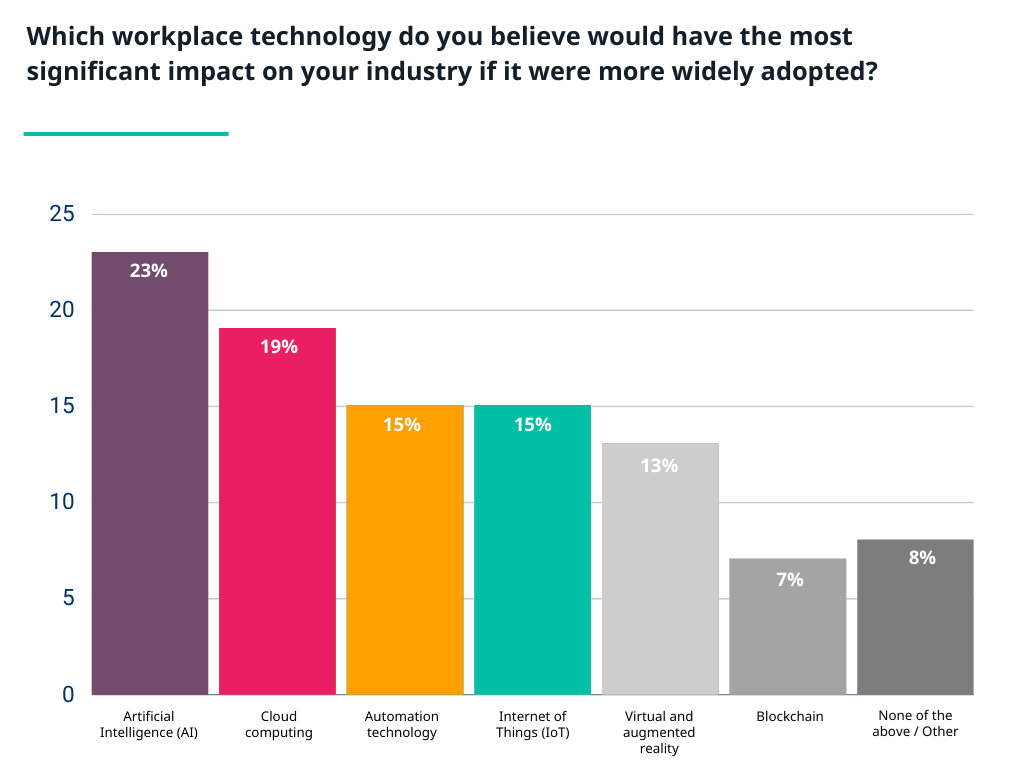
“Technology has become so central to our work lives today that even traditionally lower-tech industries must embrace a future driven by innovations like AI and automation, both in customer-facing functions like sales and marketing and back-office functions like finance and accounting,” said Laurent Charpentier, CEO of Yooz.
“Workers, and especially younger workers, understand this and look to employers that can best prepare them for this future. Companies that fail to invest in workplace technology or provide training risk losing young talent to competitors that are more forward-thinking and committed to innovation.”

-1.jpg)




